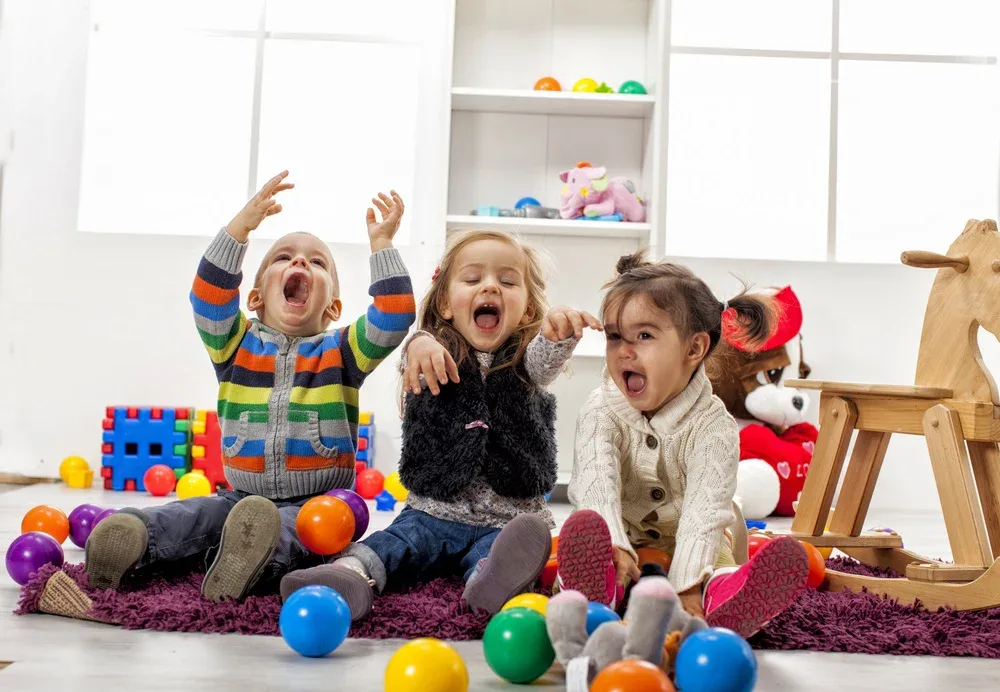
Starting daycare is a significant decision for parents, often accompanied by many questions and concerns. A common question is, “What is the best age to start daycare?” Let’s explore this topic in-depth, considering various factors and age milestones.
Contents
- 1 What Is the Best Age to Start Daycare for a Baby?
- 2 Starting Daycare at 2 Years Old
- 3 Daycare vs. Stay-At-Home Child Development
- 4 Starting Daycare at 1-Year-Old
- 5 Starting Daycare at 18 Months
- 6 Sending Baby to Daycare at 3 Months
- 7 How Long Will They Be at Daycare?
- 8 What Is Your Child’s Natural Stress Level?
- 9 Benefits Of Daycare
- 10 Why Daycare Is Good for Toddlers?
- 11 Positive Effects of Daycare on Child Development
- 12 How Daycare Centers Support Infant Development
- 13 Tips for a Smooth Transitioning to Daycare
- 14 FAQs
- 14.1 Is it okay to start daycare at a very young age, like three months?
- 14.2 How can I help my child adjust to daycare?
- 14.3 What are the benefits of starting daycare at an early age?
- 14.4 What should I look for in a daycare facility?
- 14.5 How can I balance work and parenting responsibilities while my child is in daycare?
- 15 Conclusion
What Is the Best Age to Start Daycare for a Baby?
Determining the ideal age to start daycare varies for each child and family. Several factors influence this decision, including parental preferences, the child’s temperament, financial considerations, and the availability of suitable daycare options.
Parents should assess their child’s readiness for daycare, considering factors such as:
Social and Emotional Development
Is the child comfortable being away from primary caregivers for extended periods? Are they showing signs of separation anxiety? Early social experiences can significantly impact a child’s emotional development, so gauging their readiness for this type of separation is essential.
Physical Milestones
Can the child sit up independently, eat solid foods, and nap without assistance? Are they developing fine and gross motor skills at a typical rate? These physical milestones indicate a certain level of independence and self-sufficiency, which can be important for thriving in a daycare environment.
Health Considerations
Is the child up-to-date on vaccinations and free from significant health issues? Are there any special medical needs that daycare providers should be aware of? Ensuring that a child is healthy and medically prepared for daycare is crucial for their well-being and the well-being of other children in the facility.
Family Dynamics
Are any siblings already attending daycare, influencing the decision? How will the child’s daycare schedule fit with the family’s daily routines? Family dynamics play a significant role in the decision-making process, as parents need to consider the logistical aspects of managing multiple childcare arrangements and schedules.
Work Commitments
Are parents returning to work or needing childcare for other reasons? What are the available options for flexible scheduling or part-time care? Work commitments often dictate the timing of daycare enrollment. Still, balancing these obligations with the child’s developmental needs and readiness for daycare is essential.
Starting Daycare at 2 Years Old
At around two years old, many children display increased independence and social skills. Starting daycare at this age allows them to interact with peers, fostering socialization and early learning experiences. However, some children may struggle with separation anxiety during this transition.
Parents should look for daycare centers offering age-appropriate activities and structured play opportunities. A nurturing environment with experienced caregivers can help ease the transition and support children’s emotional development.
Daycare vs. Stay-At-Home Child Development
The choice between daycare and stay-at-home parenting is deeply personal. It depends on various factors, including financial stability, parental preferences, and cultural norms. While daycare provides structured learning environments and social interactions, stay-at-home care offers one-on-one attention and flexibility in routines.
Parents should weigh the benefits and drawbacks of each option based on their family’s unique circumstances. Factors to consider include cost, availability of quality childcare, parental leave policies, and the child’s needs and temperament.
Starting Daycare at 1-Year-Old
Starting daycare at one year old presents both advantages and challenges. Younger children may adapt quickly to daycare routines and benefit from early socialization opportunities. However, parents may experience separation anxiety, and younger infants may require more personalized attention and care.
When selecting a daycare for a one-year-old, parents should prioritize facilities that offer low child-to-caregiver ratios, age-appropriate activities, and a safe, stimulating environment. Regular communication between parents and caregivers is essential to ensure the child’s needs are met, and any concerns are addressed promptly.
Starting Daycare at 18 Months
Around 18 months, toddlers undergo significant developmental milestones, including increased mobility, language acquisition, and curiosity about the world. Starting daycare at this age exposes children to structured learning environments and encourages cognitive and social development. However, parents should ensure that daycare facilities cater to the specific needs of toddlers.
Look for daycare centers that provide ample opportunities for exploration and sensory experiences, such as outdoor play areas, art activities, and group games. Open communication between parents and caregivers can help ensure a smooth transition and support children’s emerging independence.
Sending Baby to Daycare at 3 Months
Sending a baby to daycare at three months old is a decision that requires careful consideration. While some parents may need to return to work early, others may opt for alternative childcare arrangements until the baby is older. Early daycare attendance can impact bonding between parents and infants. Still, it may also provide educational benefits in the long run.
When choosing a daycare for a three-month-old, parents should prioritize facilities that prioritize infant safety and well-being. Look for centers with experienced staff trained in infant care techniques, such as safe sleep practices, feeding routines, and soothing techniques. Regular communication and visits to the daycare can help parents feel more comfortable with their choice and ensure that their baby’s needs are being met.
How Long Will They Be at Daycare?
One consideration when choosing a daycare is the length of time the child will spend there each day. Factors such as parental work schedules, commute times, and daycare operating hours should be considered. Additionally, parents should consider the child’s temperament and ability to handle longer daycare days.
What Is Your Child’s Natural Stress Level?
Every child is unique, and their response to daycare may vary based on their stress levels. Some children may adapt quickly to daycare routines and thrive in social environments. In contrast, others may experience more stress and anxiety during the transition. Parents should observe their child’s behavior and emotions closely and provide support to help them adjust to daycare.
Benefits Of Daycare
Daycare can offer children numerous benefits, including socialization opportunities, cognitive stimulation, and emotional development. Quality daycare centers provide structured learning activities, exposure to diverse cultures and experiences, and supportive environments for children to explore and grow. Want to learn more? Read our latest blog to discover the numerous benefits on daycare.
10 Significant Benefits of Daycares for Infants
Why Daycare Is Good for Toddlers?
For toddlers, daycare can provide essential opportunities for learning and growth. Interacting with peers and caregivers in a daycare setting helps toddlers develop social skills, communication abilities, and independence. Daycare also exposes toddlers to new experiences, challenges, and learning opportunities, contributing to their development. Discover more:
Why Daycare Is Good for Toddlers? Top 10 Positive Impacts
Positive Effects of Daycare on Child Development
Research has shown that high-quality daycare can have positive effects on child development. Children who attend daycare tend to demonstrate better social skills, language development, and cognitive abilities compared to their peers who do not attend daycare. Quality daycare programs provide stimulating environments, supportive relationships with caregivers, and structured learning and play opportunities. Learn more:
Positive Effects of Daycare on Child Development
How Daycare Centers Support Infant Development
Daycare centers are crucial in supporting infant development during the early months and years of life. Experienced caregivers create nurturing environments that promote sensory exploration, language development, and social interaction. Daycare centers also provide opportunities for infants to develop secure attachments with caregivers and build trusting relationships with peers. Learn more details:
How Daycare Centers Support Infant Development
Tips for a Smooth Transitioning to Daycare
Transitioning to daycare can be challenging for both children and parents. To ease the process, parents can use these tips for a smooth transition to daycare.
– Start daycare visits gradually to familiarize the child with the new environment.
– Establish a consistent routine for drop-off and pick-up times.
– Communicate openly with daycare staff about the child’s needs and preferences.
– Provide comfort items from home, such as a favorite toy or blanket.
– Stay positive and reassuring during drop-off, emphasizing that daycare is a safe and fun place to learn and play.
FAQs
Is it okay to start daycare at a very young age, like three months?
While some parents may need to start daycare early due to work commitments, it’s essential to consider the child’s developmental stage and bonding needs. Early childcare can provide educational benefits but should be balanced with the infant’s need for bonding and attachment.
How can I help my child adjust to daycare?
Transitioning to daycare can be challenging for children, especially younger ones. Parents can ease the process by gradually introducing daycare routines, visiting the facility beforehand, and maintaining consistent communication with caregivers. Establishing a comforting goodbye routine can also help reassure the child and build trust with their caregivers.
What are the benefits of starting daycare at an early age?
Early daycare attendance can promote socialization, cognitive development, and school readiness skills. Children also benefit from exposure to diverse learning environments and peer interactions. Additionally, daycare can provide structure and routine, benefiting children’s development.
What should I look for in a daycare facility?
Parents should prioritize safety measures, qualified staff, stimulating learning environments, and proximity to home or work when choosing a daycare. Additionally, consider the center’s philosophy on child development, cleanliness standards, and parent involvement opportunities.
How can I balance work and parenting responsibilities while my child is in daycare?
Balancing work and parenting requires careful planning and prioritization. Setting realistic expectations, seeking support from family or friends, and maintaining open communication with employers can help parents manage their responsibilities effectively. Creating a consistent daily routine and carving out quality time for family activities can help maintain a healthy work-life balance.
Conclusion
The decision to start daycare is multifaceted, influenced by individual circumstances and child-specific factors. While there is no one-size-fits-all answer to the best age to start daycare, parents should prioritize their child’s well-being, developmental needs, and family dynamics when making this important decision.
Are you ready to give your child the best possible start in life? Enroll them in DeeCyDa Daycare’s Infant Care Program today and experience the difference firsthand. Our team is committed to giving infants the love, care, and attention they need to thrive. Focusing on nurturing social, emotional, and cognitive development, our Daycare Program sets the stage for a lifetime of success. If you’re searching for “daycare near me” or “daycare in Irvine,” look no further than DeeCyDa Daycare for a trusted and reputable childcare option. Contact us today!

